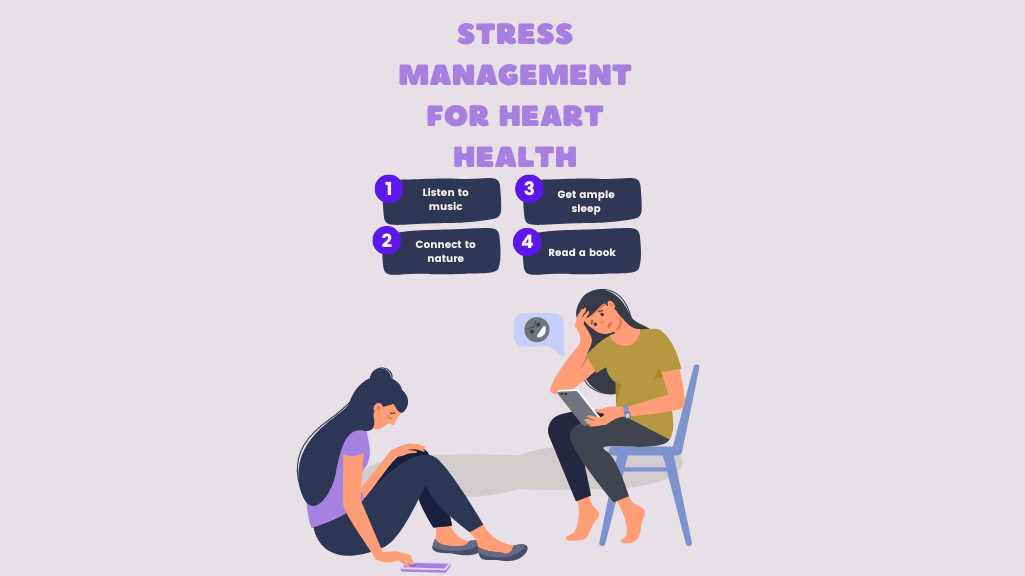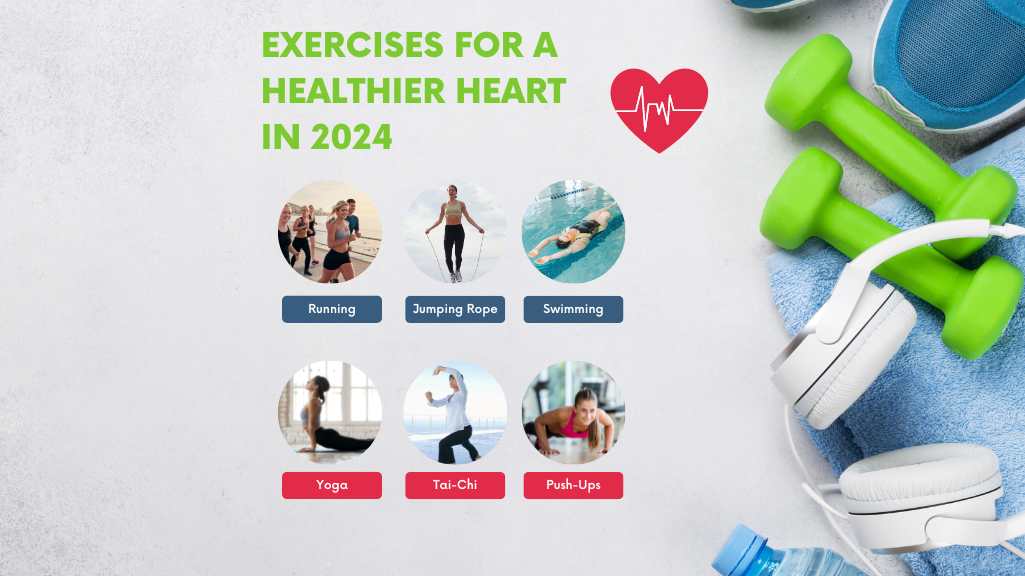Introduction
Given the fast-paced environment we find ourselves in, heart health tips are a matter of great importance. In any case, it remains that for people globally, lifestyle habits that promote a healthy heart are vital since cardiovascular diseases still top in terms of causing deaths. As 2024 dawns, new fads and studies could make sure your heart stays fit. Therefore, this article will provide scientifically proven tips to have a healthy lifestyle that promotes a healthy heart.
Table of Contents
Heart Health tips
In 2024, heart health tips is discussed widely among public health experts. One can easily monitor their heart through wearable technology and telehealth services. Additionally, the COVID-19 crisis has further emphasized on the need for an effective cardiovascular system. It is important to maintain a healthy heart because by doing so not only our lives are extended but also there is prevention from chronic diseases enhancing better quality life.

Main Points of Heart Health Tips
Effective strategies may be developed if one understands the various factors influencing heart health tips. This part provides details of key issues relating to heart health.
Lifestyle Factors
Diet and Nutrition
The essence of food on one’s own well-being is vital as far as the maintenance of a healthy condition of human hearts is concerned. In particular, taking balanced diet rich in fruits, vegetables, whole grains and lean proteins reduces chances of developing having cardiovascular disease significantly. For example, recent studies highlight advantages of Mediterranean diet rich in unsaturated fats, fiber and antioxidants like vitamins C & E (Byers et al., 2018). The new England journal of medicine published a study indicating that people who ate Mediterranean diet had 30% fewer major cardiovascular problems than those who ate regular control diets (Estrus et al., 2013).
- Eat A Heart-Healthy Diet: Add more vegetables, fruits whole grains and lean proteins to your eating plan; consume less processed foods, sugars or bad fats.
- Control Food Portion Sizes: Appropriate meal portioning aids in weight management and reduces risks of heart disease. Employ smaller dishes to avoid second assistance.
- Drink More Water: Hydrating your body is essential for overall health and can assist with maintaining a healthy weight
Physical Activity of heart health tips
Exercising regularly enhances the heart muscle, boosts blood flow, and helps with weight management. The American Heart Association advise at least 150 minutes of moderate-intensity aerophilous exercise each week. Traveling, cycling, swimming is among examples of cardiovascular exercises. In 2024 wearable technology has become an indispensable component in tracking physical activity by giving real time feedback and motivation.
- Find Activities You Enjoy: Do things that make you happy such as dancing, hiking or playing any sport to ensure you remain active. This enables adherence to exercise routines.
- Include Strength Training: As well as getting involved in aerobic activities, add at least two strength training exercises per week for general fitness improvement and better heart health.
- Use Tech Tools: Use fitness trackers and apps so that you can track your progress and stay inspired.
Sleep Quality
- Make Sleep a Priority: Good sleep is important for the heart. Therefore, you should aim at having seven to nine hours every day. When one has lack of sufficient sleep it contributes to high blood pressure causing redness which may result into disorders associated with the cardiovascular system.
- Establish Bedtime Routine: Try going to bed at same time each night even on trips because it will help control your body’s internal time.

Risk Factors
Hypertension
Heart disease is caused by hypertension or high blood pressure. It can damage blood vessels and cause strokes or myocardial infarction. What is involved in controlling hypertension? Regular checking of blood pressure and adopting healthy habits like reduction of salt intake, stress management among others are key components in this area. The Journal of Hypertension suggests that even a small reduction in high blood pressure can result to a decrease of 20% in the risk of cardiovascular events
Cholesterol Levels
Enhanced cholesterol levels contribute to plaques creation in arteries which increases the risk of heart diseases. Dieting, exercising, medicine is vital for control of cholesterol level. Foods such as seafood and flax seeds that are rich in omega-3 fatty acids help keep healthy cholesterol levels. Statins have revealed considerable reduction in heart disease risk.
Smoking Cessation
- Quit Smoking: The largest risk factor for heart disease is smoking. Leaving smoking improves heart health greatly and diminishes the chances of cardiovascular events.
- Seek Support: Exercise smoking cessation programs, guidance and medications to help quit smoking.
Alcohol Consumption
- Limit Alcohol Intake: High Blood Pressure may occur due to overindulgence in alcohol leading to stroke or Heart Failure condition. Restraint could be best explained by drink one drink per day for women but two drinks per day will be okay for men.
- opt for Healthier Alternatives: Choose non-alcoholic beverages and stay hydrated with water.
Impact of heart health tips
Heart health has far-reach implications, affected not just people but also society and the healthcare system at huge.
Societal Impact
Cardiovascular diseases burden healthcare systems worldwide significantly A significant portion of America’s annual medical bill amounting billions is devotedly consumed by cases related with this disease alone. These costs can be reduced while improving overall public health if attention is paid towards promoting heart wellness among people.
Personal Impact
At the individual level, maintaining heart health improves quality of life. It enables people to remain active, lessens chances of chronic diseases and increases longevity. Furthermore, mental well-being can be supported by a healthy heart because physical wellness if closely related to emotional wellness.
Heart Health Tips: Strategies or Solutions
Implementing effective strategies can significantly improve heart health. This section provides practical heart health tips and expert recommendations.
Stress Management
- Practice Mindfulness: Abilities such as meditation, yoga, and deep breathing can reduce stress levels and improve heart health.
- Maintain Social Connections: Strong social help can help manage stress. Stay connected with friends and family through regular trades.
- Seek Professional Help: If stress becomes surprising, consider speaking to a mental health expert.

Technological Advancements
- Wearable Devices: Heart health control has been revolutionized by wearable technology’s appearance. Smart watches are for instance capable of trace pulse rate, physical workout examples and even detecting abnormal heartbeat rhythms among others. A study in the Journal of Medical Internet Research (2023) highlighted that regular use of wearable devices can lead to better management of cardiovascular health.
- Telehealth: Telehealth facilities have become increasingly popular particularly after COVID-19 pandemic. They enable patients with heart situation to monitor their condition slightly as well as have virtual consultations instead having them go for check-ups all now and then. Through telehealth facilities a patient is assisted in clinging to his treatment plan thus improving overall results on his/her cardiovascular system according to American Heart Union
Case Studies or Real-life Examples.
The implementation was successful
- The Blue Zones: Ryukyu, Japan and Sardinia, Italy is some of the Blue Regions where people live the longest. They have heart-healthy diets as well as active routines and strong social bonds that reduce their chances of getting heart illness
- Employee Wellness Programs: Some businesses started wellness programs to encourage heart health among their employees. Johnson & Johnson’s well-being program, for example contains wellbeing challenges, healthy eating workshops and stress management resources that improve employee health and reduce healthcare costs.
Notable Failures
- Unsuccessful Diet Trends: Some diet trends like low fat diets are unsustainable and might even be dangerous. Instead of this a demented diet which focuses on healthy fats is more powerful for a person’s long term heart health.
- Lack of Physical Activity: Though exercise has many benefits, much of the community is inactive. Public health enterprises need to address barriers to physical activity such as lack of time and access to abilities
Further Hints and Recent Research
Impact of Diet on Heart Health
- Mediterranean Diet Benefits: The Central diet is advantageous for heart health as per fresh study. A 2021 research story in the Newspaper of the American Heart Union found out that protruding to Halfway diet reduced the risk of cardiovascular events especially in predecessor conditions like diabetes or hypertension.
- Plant-Based Diets: According to a study by American Journal of Clinical Food (2022), vegan diets substantially decrease the risk of cardiovascular diseases. These hold lots of fiber, impediments and good fats that can help in lowering cholesterol levels and blood pressure.

Exercise and Heart Health
- High-Intensity Break Training (HIIT): According to a record in the Journal of Cardio2023, HIIT is extremely useful in enhancing cardiovascular fitness and action associated with heart disease. The HIIT method includes of sudden bouts of strong physical activity followed by short periods of rest or low force exercise. Why HIIT And Its Advantages.
- Cardiovascular Fitness Progress: By increasing heart rate fast, HITT boosts cardiovascular endurance as well as efficiency.
- Lowering Heart Disease Risk Elements Blood pressure, insulin sensibility, and cholesterol levels can improve through HITT.
- Efficient workout: In comparison to traditional moderate intensity exercise, HIIT can achieve significant health benefits within a shorter time frame.
- Calorie burning: The high intensity nature of the workout leads to greater amounts of energy used up for both during and after the workout sessions.
- Increases metabolism: For various hours after working out, HITT can grow metabolic rates which helps in managing weight.
- Yoga and Heart Health: According to research from European Journal of Preventive Cardiology (2022), the authors have observed that the practice of yoga has a tendency to slash the risk factors for heart disease which are blood pressure, cholesterol levels and body mass index (BMI). Also, it is important to note that yoga too helps in managing stress as an advantage for heart health. 23% less chances for any sort of cardiovascular events occur in people who did yoga on a daily basis although for other folks none whatsoever says this paper study.

Conclusion: heart health tips
To live long and have a fulfilling life, your heart must be in perfect condition. You can improve your cardiovascular fitness by doing things like having a good diet, regular exercise and learning to manage stress better. It is worth noting that such changes go beyond personal benefits but also touch on societies’ wellness through reduced medical expenses as well as improved public health results. Let us walk together into 2024, while we prioritize our hearts for better lives.
Call to Action
Start taking care of your heart today. Check out what you are currently doing in relation to your current lifestyle and make any adjustments that may be necessary and consult an expert if need be. We can build a community that is heart healthy together, so that the future is brighter for the next generation–the healthier ones.
FAQ’S on Heart health tips
1. And how can one improve their heart health through diet?
Answer: Gaining a healthy heart involves maintaining a balanced diet by introducing it to nutrient-dense foods and avoiding dangerous substances. Here are some slight alterations:
- Increase vegetable and fruit intake: Aim for various colorations in order to have various nutritional values and inhibitors
- Select wholegrain: Go for whole grains rather than polished grains to boost fiber intake which helps to lower cholesterol levels.
- Present healthy fats: Incorporate such sources of dehydrated fats as olive oil, avocados, nuts, and seeds while reducing saturated and trans-fats present in refined and fried foods.
- Reduce on salt intake: Excessive sodium content lifts blood pressure, so skip high salt-including products as well as avoid adding extra salt into dishes.
- Use lean protein sources when cooking food: Instead of red meat or processed meats, go for fish, poultry or legumes since they are low fat options.
2. What’s the function of physical exercise in promote a healthy heart?
Answer: Normal exercise is important for cardiovascular health. Some of these advantages include:
- Strengthening the Heart Muscle: This helps the heart work more efficiently thus improve blood pumping within your system
- Good blood circulation: Physical activity maintains arterial elasticity and venous tone hence ensuring proper flow of blood
- Reducing risk factors: Working out frequently helps manage weight alongside other benefits like normalizing high blood pressure or even reducing bad cholesterol (LDL) levels while raising good cholesterol (HDL)
- Increase fitness overall: Walking, jogging, swimming and cycling enhance cardiovascular stamina and general fitness levels
- Stress management: Exercise is known to lower stress levels thus improving mental health that finally has an impact on one’s heart condition.
3. What is HIIT (High-skill Interval Training) supposed to mean in conditions of its relationship with artery health?
Answer: High-skill interval training (HIIT) explains a type of exercise that entails short explosions of vigorous activity substituted with brief rest or low-intensity exercise. Such benefits for the heart include:
- Improvement in cardiovascular fitness: It can be done at high capacities to increase heart rate, improving cardiovascular perseverance and efficiency.
- Reducing risk elements for heart disease: HIIT has been shown to enhance blood pressure, insulin sensibility and cholesterol levels.
- Capability of the workout: it can lead to great developments in health within shorter periods as compared to traditional moderate intensity workouts.
- Burning calories: The workouts are intense enough to burn more calories during and after the sessions
- Boosts Metabolism: HIIT elevates metabolism hours after it is done hence managing weight properly.
4. Is sleep necessary for maintaining normal heart function?
Answer: Sleep acts a crucial role in holding cardiac health. Enough and good sleep helps:
- Control Blood Pressure: Consistent sleep examples can help keep healthy blood pressure levels.
- Reduce inflammation: Penniless sleep quality often leads to increased redness in your body which is one of the risks connected with developing heart disease.
- Support Heart Function: During sleep, both your heart and blood vessels go through repair works and maintenance activities.
- Maintain Weight: Good sleeping habits regulate hormones related to hunger hence preventing obesity-an important determinant for cardiovascular diseases’ occurrence.
- Lower stress levels: Having enough sleep lessens stress hormones that could otherwise strain your heart muscles too much
5. Can technology support tracking and improving cardiovascular system?
Answer: Yes, technology can do much when it comes to monitoring and enhancing good condition of human hearts as discussed hereunder:
- Wearables: These include fitness trailers that monitor heart charges, physical activity, sleeping trends as well as detect any irregularities in heartbeat.
- Mobile Applications: There are several health apps that offer personal practice programs, diet trackers, and/or remembrance notifications for drug intake/medical check-ups.
- Telehealth: Remote control of patients’ heart conditions by monitoring them and having consultations with doctors is now simpler than ever before owing to telehealth services which eliminates the need for frequent physical calls.
- Electronic medical records (EMRs): These help to maintain a detailed and readily available account of an individual’s health information that aids in better managing heart disease.

